My shopping cart
Your cart is currently empty.
Continue ShoppingRosanne Cash is on a roll. Her new autobiography Composed reached #16 on the New York Times best-sellers list (non-fiction), and #6 on the Los Angeles Times. On September 10 her latest CD The List won Best Album at the Americana Music Awards.
I have known Rosanne Cash since the late 1980s when I met her in Nashville. At the time, I was directing Randy Travis in a video for his song “I Told You So.” Later I directed Rosanne in a video from her album Interiors. We started to become friends. A few years later, I posted a piece about Rosanne’s video on my website, and, idly, gave it the headline: “I love Rosanne Cash. You should, too.”
I was a little startled by that headline. I hadn’t really considered it. It just popped out. But on a moment’s reflection I found no reason to argue with it, so I left it.
In her new autobiography Composed, Rosanne Cash has just given us reason to love her even more.
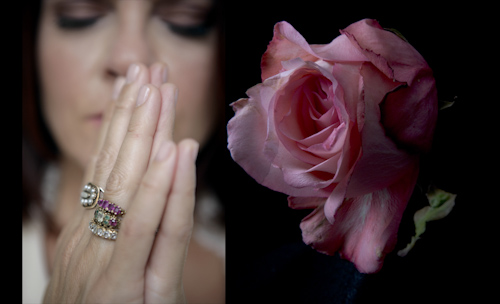
Rosanne Cash. “Pray” 2005. © Ethan Russell
You act like you were just born tonight
Face down in a memory but feeling all right
Who does your past belong to today?
You don’t think nothing when you’re feeling this way.
Girls in the bar thinking, ‘Who is this guy?’
But they don’t think nothing when they’re telling you lies.
You look so careless when they’re shooting that bull.
Don’t you know heartaches are heroes when their pockets are full?
Tell me you’re trying to cure a seven year ache
See what else your old heart can take.
Boys say, ‘When is he gonna give us some room?’
Girls say, ‘God I hope he comes back soon.’
I liked the song unselfconsciously. It spoke to me and didn’t ask too much in return.
It had a hook, and I listened to it repeatedly. But it was smart. Behind its apparent simplicity you could feel a real intelligence at work. (When in my last blog I suggested that singer songwriters were the most important writers of my generation, did I mention you could sing along?)
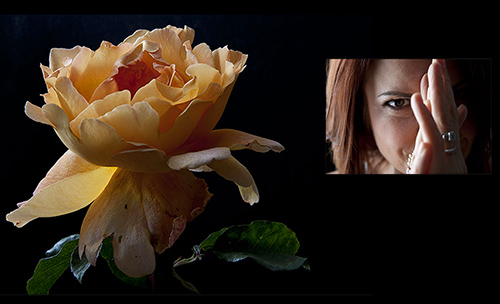
Rosanne Cash © Ethan Russell
Rosanne doesn’t exempt herself. She never does:I belong to an extended family of musicians whose members sprawl across generations. At the heart of all real country music lies family, lies a devotion to exploring the bonds of blood ties. ...(But) the family has... faded in country music as sexual heat has begun to obsess most singers and songwriters...
I had written songs almost exclusively about romance and all the attending little dramas of loss and lust... It’s all good fodder for song, but the hormonal flushes of love affairs are not the only things going on in a life... Mostly hidden from view are the other potent relationships, forged of blood and shared history, rich with emotional content, ripe for exploration.
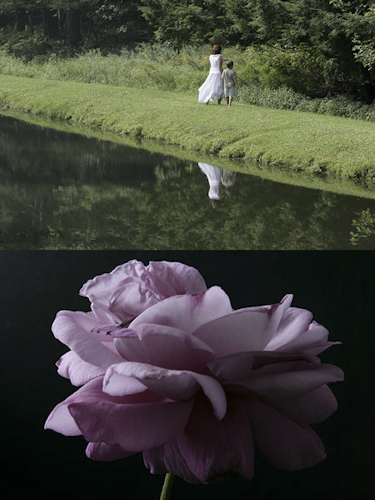
Rosanne Cash with her son. © Ethan Russell
Soon after Composed opens the reader is with her on the dry Ventura hillside where her mother outfits the children in clean and proper young-girl dresses and then goes outside to kill rattlesnakes.
At the core of Rosanne’s work as an artist, I venture, is her simple refusal to leave her life unexamined. But in the translation of it from her private to public life she applies her set of moral decisions. Composed contains her life, which, despite her disclaimer that is not the linear narrative of a standard biography, I found unfolds in an entirely comprehensible way, as we follow her from the Casitas hillside to Nashville, to Jamaica, to London, and New York. And the experiences that she relates range from straightforward descriptions of what it was like for a 20 year old to embark for London with dreams of her future to the more complex issues like living with her father’s fame.
Her mother’s appearances in the pages are frequent, honest. Her mother’s life was contained. A strong Catholic, she was a gardener of her flowers and her children and fearful of the life her absent husband was leading. (Both Rosanne’s mother and father appear happier after their divorce and remarriage). But despite Rosanne’s even-handedness as a writer, it is her father who emerges as a complex, looming figure, with his combination of personal demons mixed with a depth of passion and love.
What one encounters in this book is not people’s private moments frozen in a flash-on-camera snapshot, like a deer caught in the headlights. Quite the contrary, Rosanne brings a compassion for the people in it, for herself, her family, and her friends. There is no “Gotcha!” here, and her decision is deliberate.
I teared up four or five times in this book — not a common experience for me. These were not tears of sorrow but of the sharp recognition of kindness, of people’s reactions to their encounters with mortality and grief, and the human sympathy that can sometimes emerge from that. In one of the scenes that caused me to tear up Johnny Cash writes to Rosanne after the loss of her baby in the 17th week:Dear Rosanne... I was driving down to the farm this afternoon, grieving for you when suddenly I felt the presence of my mother so strong it was overwhelming... I saw her death again but it wasn’t painful this time. In my mind’s eye I saw several angels come down to each side of her and bear her spirit up and away and out of sight... I shouted aloud, “Don’t go away... I said, “Go to Rosanne and minister to her because she desperately needs you... Your family loves you... You will persevere.
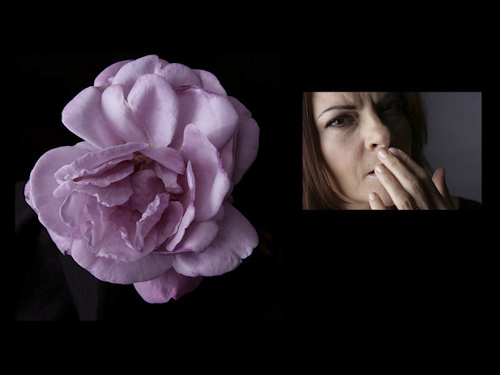
Rosanne Cash 2005. © Ethan Russell
Then in her late forties Rosanne’s life encounters something a lawyer acquaintance of mine used to call the “parade of the horribles.” In an extraordinarily compressed window of time she loses her stepmother, her father, her mother, her stepsister, and her aunt.
During that same time I lost my mother, my older brother, and then (within a year) my younger brother.
We shared this experience and talked about it. Black Cadillac was her album of songs that came from this time, and I was asked to shoot the cover and the booklet that would accompany it. I had my own experiences, walking in West Marin after my older brother’s death and looking at the sky and trying to fathom what it means when people leave and are just gone, outside of our senses.
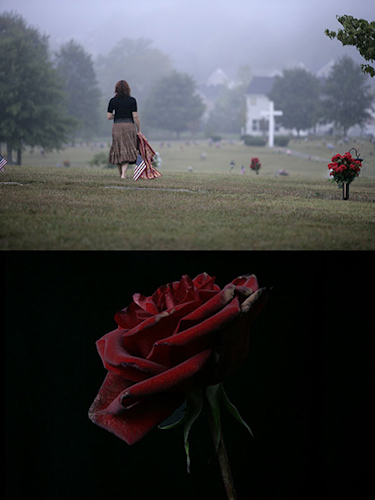
Rosanne Cash at the graveyard after her father’s passing. Tennessee. 2005. © Ethan Russell
But I was also struck by how Rosanne had to somehow make psychic room for the entire world after the loss of her father. This process of sharing your parents with the world is unique to children of the famous. In the tenuous dance between public and private lives people feel they know Rosanne, or feel they know her father. In another story (this book is full of experiences both quirky and touching) she is in Norway, confronted with Norwegian cowboys wearing “tight jeans with big belt buckles and Stetson hats.” One of them walks up to her and asks, “Do you luff your fater?” ‘
Rosanne answers, guardedly given the question, “Yes.”
“NO!” He bellows, hitting himself on the chest, “I luff your fater!
Imagine.
And then in 2007 as if living her own line, “See how much your old heart can take,” Rosanne learns she must have brain surgery. It is a vivid scene she describes walking into the operating room (“I explained I would be more frightened if I didn’t walk into it under my own steam.”) I remember standing and watching my own mother wheeled into heart surgery when she was 81, and I think of Rosanne’s children thinking of her. She survives. She perseveres. She writes an autobiography and shares it all with us. (There’s more to a life, indeed, than hormonal flushes.) I love Rosanne Cash. You should too.
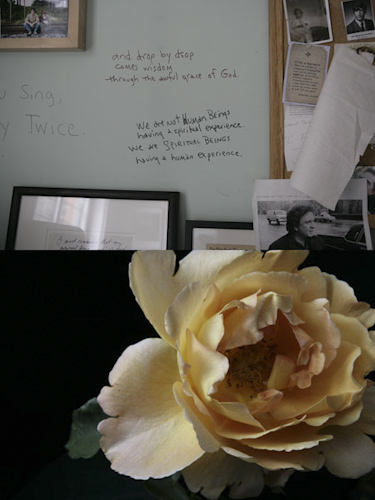
Rosanne Cash’s study. New York City © Ethan Russell
=============
You can buy Composed here, and The List here. You can visit Ethan Russell’s website (and see more Rosanne Cash photos) here.